An exhibition curated by Mark Ferelli Original set stills by John Jay
Magic Lantern performances by Mark Ferelli
with a specially composed soundtrack by Adele Nozedar
Exhibition runs 5th December 2005 – 21st January 2006
Performances upon
December 3rd – opening (invitation only) 7.30pm
Sunday 18th December, 7.30pm
Saturday 21st January, 7.30pm
April of this year saw the passing of John Jay, veteran film stills' photographer, internationally renown for his illustrious career of work on many major film productions including 'Straw Dogs', '2001: A Space Odyssey' and 'Star Wars'.
During the autumn months of 1970, while based at Elstree Studios, Jay was assigned to the floor of a new Anglo-American production,'The Abominable Dr.Phibes', a film under the hand of British director Robert Fuest, starring horror veteran Vincent Price in the lead role.
As was usual industry practise at that time, John Jay built an extensive portfolio of on-set images for the complete duration of production, destined to become select material for the film's publicity department.
It was John Jay's prolonged residency in the haunting ballroom lair of Dr. Anton Phibes, and a lengthy fascination with a single still in particular, that led Magic Lantern artist Mark Ferelli to a very special meeting with John earlier this year. An afternoon of conversation and exchange which would sadly prove to be John Jay’s last on the subject.
The later discovery of rare Elstree-era original prints from John Jay's own archive by close friend Vincent Murray was set to play an important part in the gestation of
'Phibes Risen'. More than 30 years on, looking over the number of beautifully wrought stills that survive, it is fair to say that we are witness not only to an invaluable production record of a horror film classic, but a singular body of work that holds a unique, independant value in its craft, quality and artistic integrity, perhaps outside and even beyond the accepted auspices of the film itself.
Within his personal selection and showing of a number of these stills,
Ferelli places his own mediumistic birthing, "The Angelus of John Mark Jay", amongst their number on the walls, by virtue of the flame and glass operations of a biunial Magic Lantern. The lantern, itself resonant with the very beginnings of cinema, and its prescient echoes of such leading 18th Century phantasmagores as Robertson and Philidor, conveys a performance borne of that pivotal yet seemingly absent Jay still of the hidden, skull-faced Phibes in deathly embrace with his female assistant Vulnavia.
All elements expand in folds of correspondence; further meetings, where the supposed historical death and obsolescence of "publicity still" and "magic lantern" find a new plateau of atavistic vigour, risen in that dark, there among the ethereal complexities of each others presence; psychically charged with the inherent, uncanny processes of reproduction.
But more than any interpretation, for Ferelli the result is the febrile sum of all his many years of inner maturation, digestion, desire and remembrances of that image, exposed now from the psychic body and made visible within the sombre dissolve and optically diffuse becomings of its projected view.
Original set stills by John Jay
Magic Lantern performances by Mark Ferelli
with a specially composed soundtrack by Adele Nozedar
Exhibition runs 5th December 2005 – 21st January 2006
Performances upon
December 3rd – opening (invitation only) 7.30pm
Sunday 18th December, 7.30pm
Saturday 21st January, 7.30pm
April of this year saw the passing of John Jay, veteran film stills' photographer, internationally renown for his illustrious career of work on many major film productions including 'Straw Dogs', '2001: A Space Odyssey' and 'Star Wars'.
During the autumn months of 1970, while based at Elstree Studios, Jay was assigned to the floor of a new Anglo-American production,'The Abominable Dr.Phibes', a film under the hand of British director Robert Fuest, starring horror veteran Vincent Price in the lead role.
As was usual industry practise at that time, John Jay built an extensive portfolio of on-set images for the complete duration of production, destined to become select material for the film's publicity department.
It was John Jay's prolonged residency in the haunting ballroom lair of Dr. Anton Phibes, and a lengthy fascination with a single still in particular, that led Magic Lantern artist Mark Ferelli to a very special meeting with John earlier this year. An afternoon of conversation and exchange which would sadly prove to be John Jay’s last on the subject.
The later discovery of rare Elstree-era original prints from John Jay's own archive by close friend Vincent Murray was set to play an important part in the gestation of
'Phibes Risen'. More than 30 years on, looking over the number of beautifully wrought stills that survive, it is fair to say that we are witness not only to an invaluable production record of a horror film classic, but a singular body of work that holds a unique, independant value in its craft, quality and artistic integrity, perhaps outside and even beyond the accepted auspices of the film itself.
Within his personal selection and showing of a number of these stills,
Ferelli places his own mediumistic birthing, "The Angelus of John Mark Jay", amongst their number on the walls, by virtue of the flame and glass operations of a biunial Magic Lantern. The lantern, itself resonant with the very beginnings of cinema, and its prescient echoes of such leading 18th Century phantasmagores as Robertson and Philidor, conveys a performance borne of that pivotal yet seemingly absent Jay still of the hidden, skull-faced Phibes in deathly embrace with his female assistant Vulnavia.
All elements expand in folds of correspondence; further meetings, where the supposed historical death and obsolescence of "publicity still" and "magic lantern" find a new plateau of atavistic vigour, risen in that dark, there among the ethereal complexities of each others presence; psychically charged with the inherent, uncanny processes of reproduction.
But more than any interpretation, for Ferelli the result is the febrile sum of all his many years of inner maturation, digestion, desire and remembrances of that image, exposed now from the psychic body and made visible within the sombre dissolve and optically diffuse becomings of its projected view.
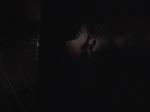
|
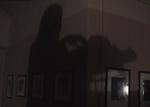
|
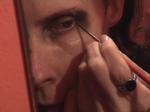
|
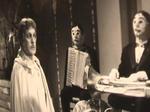
|
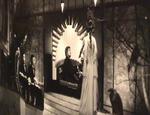
|
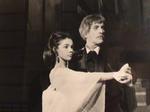
|
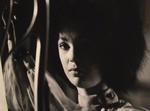
|
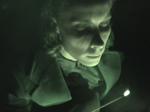
|
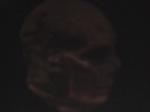
|
